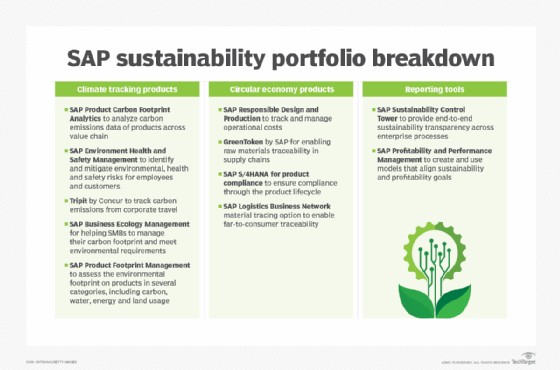
Getty Images
SAP teams up with BCG on sustainability strategy
SAP and BCG combine products to enable implementing sustainability programs around eliminating carbon emissions, reducing waste and tracking environmental, social and governance information.
SAP is partnering with management consulting heavyweight Boston Consulting Group to help organizations establish their sustainability strategies.
The partnership will offer a variety of services around setting a corporate sustainability strategy, centered on both SAP and BCG's product portfolios, according to the companies.
The products include SAP Sustainability Control Tower, SAP Product Footprint Management and CO2 AI by BCG.
 Vivek Bapat
Vivek Bapat
The partnership came about primarily because there was a significant demand from customers across all industries to incorporate sustainability as a core part of their operating business, according to Vivek Bapat, SAP senior vice president for purpose and sustainability marketing and solutions.
To do so, companies need to first establish a sustainability strategy in three areas, Bapat said. First is decarbonization across the business, both on the operational side and in upstream and downstream supply chains. The second is waste elimination, including plastics, water conservation and responsible mining. Third is social issues like using child labor, he said.
Companies need to be able to measure and report on the progress they make in achieving sustainability goals, which can show proof that any claims are not greenwashing, according to Bapat.
"This means providing our customers with the ability to get a true sense of where they were today quantitatively," he said. "But also showing the progress that they were making so that they can prove to the market that they are actually making progress, or lack thereof."
Companies need a place to start with sustainability
However, companies today usually don't know where to start in developing a sustainability strategy, which is why the BCG's management consulting approach and specialized tools combined with those from SAP can be particularly valuable, Bapat explained.
BCG's management consulting methodology helps organizations assess where they are with sustainability, he said. Organizations can then use the combination of SAP and BCG tools to determine the strategic objectives of what they want to accomplish, according to Bapat.
"In the past, [BCG] would have said it's up to you to figure out the technology solutions," Bapat said. "But now SAP can come in with the technology enablement, whether it's in terms of data or business process changes."
To help organizations achieve zero-emissions goals, for example, the offering integrates SAP Product Footprint Management with CO2.AI by BCG via SAP Business Technology Platform, according to Bapat. SAP Product Footprint Management helps to measure and analyze carbon emissions throughout the organization, while CO2.AI by BCG is an AI-based product that enables supply chain collaboration around emissions.

Know where you are first
BCG is a necessary partner for SAP because many organizations have little understanding of how technology can help them to become more sustainable organizations, said Marta Muñoz, practice lead for Europe technology for sustainability and social impact at IDC.
The first step in the journey to becoming more sustainable is to undertake an advisory strategy process, she said.
 Marta Muñoz
Marta Muñoz
"Later on in the journey, you might think about your infrastructure partners, equipment manufacturers or cloud providers, but the first step is understanding and putting together a strategy that enables you to think in the longer term," Muñoz said. "That's what BCG brings to the table, and they've had a strong sustainability practice for many years."
Both SAP and BCG have taken the time to bring their propositions together and have done a good job mapping the offering to the three main categories around zero emissions, zero waste and environmental, social and governance reporting, she said.
"It's significant that they have a good understanding of what their customers' needs and challenges are at the moment," Muñoz said.
The partnership can help companies put together a business case on how and why using technology can help them meet sustainability goals, like becoming more energy-efficient, improving their reputation and trust, and complying with an increasing array of regulations, she explained.
"For example, one of their propositions focuses on ESG reporting," Muñoz said. "Right now, this is the No. 1 pain point amongst organizations around the world who are being driven by their stakeholders, their regulators, their countries' governments, towards reporting on these ESG parameters and they don't necessarily know how to do it. So it's about bringing that together in one place."
The SAP and BCG partnership is part of a larger trend that will continue to expand, she said. For example, in January IBM acquired Envizi, an Australia-based firm that focuses on measuring and reporting on sustainability throughout a company's supply chain.
"We're in for quite a bit of a changing space in the next few years, as budgets and investment in sustainability are likely to increase -- especially in Europe," Muñoz said. "The change is dramatic and signifies how organizations are changing their mindset around sustainability. They're putting money where their mouths are, and this is not just another trend that's going to go away with time."
Jim O'Donnell is a TechTarget news writer who covers ERP and other enterprise applications for SearchSAP and SearchERP.






